News
Deconstructing the Ellen DeGeneres cover up of Kevin Hart’s latent homophobia


TV host Ellen DeGeneres and comic Kevin Hart love each other, as they made perfectly clear in the special hour-long “Ellen” show that aired Friday, Jan. 4.
“I love you,” DeGeneres said after they each proffered a lengthy rant on Hart’s withdrawal as host of the Academy Awards show this February 24.
“I love you more,” Hart replied.
The love fest appeared designed with two primary objectives: 1) to publicize Hart’s latest movie; and 2) for the world’s best known and popular lesbian on TV to absolve Hart of any and all past homophobia.
“I believe in forgiveness. I believe in second chances. And I believe in @KevinHart4real,” DeGeneres tweeted Thursday night as video clips of the interview were released.
But what the interview did, at least in some corners of the LGBT community, was cast a bucket-load of shade on DeGeneres’ like-ability without rehabilitating Hart’s admittedly flawed personality.
Hosting the Oscars was a life-long dream, Hart told DeGeneres, who noted that she suggested he pursue the hosting gig at a dinner with him after her second Oscar hosting turn in 2014 (the first in 2007 was also a lifelong dream of hers ). He was elated when the Academy Awards offered him the job—only to become quickly deflated after posts in social media dredged up anti-gay comments Hart made on Twitter and during his stand-up comedy routine. One from 10 years ago, in particular, was deemed extraordinarily harsh, when he joked about beating his son to prevent him from becoming gay.
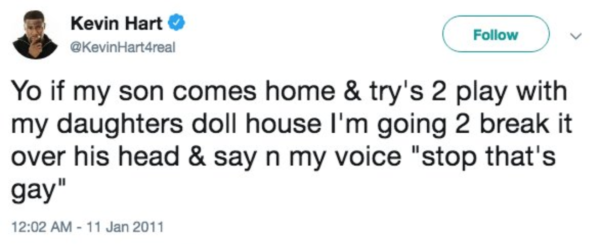
Hart’s apparent affection for the anti-gay “F***king F*g” slur also came to the fore:
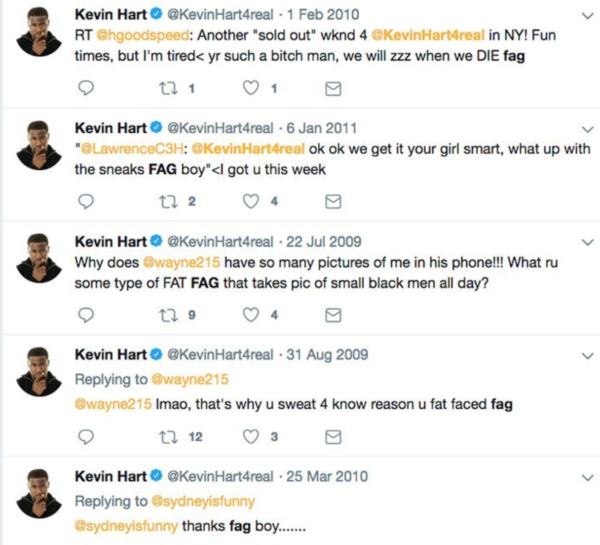
Twitter and Instagram exploded on Dec. 6 after Hart adamantly refused to apologize for the tweets—which were deleted after the Oscar announcement—saying he had repeatedly apologized when they were first brought to light years ago.
Out “Billy on the Street” comic Billy Eichner’s responses to the ongoing saga Dec. 6 reverberated throughout the Twitterverse.

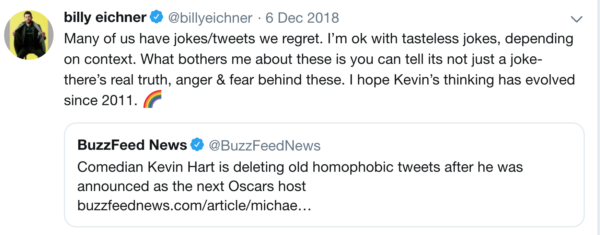
“Many of us have jokes/tweets we regret. I’m ok with tasteless jokes, depending on context. What bothers me about these is you can tell its not just a joke-there’s real truth, anger & fear behind these. I hope Kevin’s thinking has evolved since 2011,” he tweeted.
Eventually, Hart stepped down and issued an apology: “I sincerely apologize to the LGBTQ community for my insensitive words from my past.”
To which Eichner responded, as if the matter was now drawn to a close and the choice of new host became the focal point, including black lesbian comedienne Wanda Sykes.

But then came the DeGeneres interview in which the TV host pushed the comic to reconsider the job after expounding on Hart’s talent and announcing that she called the Academy and asked them to have him back.
“I have no idea if he wants to come back and host but what are your thoughts,” DeGeneres said she told the Academy. “And they were like, ‘Oh my god! We want him to host! We feel like maybe he misunderstood or it was handled wrong or maybe we said the wrong thing. But we want him to host. Whatever we could do, we’d be thrilled and he should host (applause) So the Academy is saying what can we do to make this happen?”
DeGeneres did not identify the Academy person with whom she spoke, nor did an Academy spokesperson immediately respond to Variety‘s request for comment. But Hart seemed buoyed by the adulation.
“Leaving here I promise you I’m evaluating this conversation,” Hart said. “This is a conversation I needed to have, I’m glad I had it here. I’m glad it’s as authentic and real as I could’ve hoped it would be.”
But how authentic was it, really? Let’s look at six minutes of the hour-long effort to get Hart’s job back.
Hart spent several insight-free minutes explaining how he would not be the victim of social media, deciding at first to ignore the critical tweets to not “fuel the fire.” And to anyone who has been the subject of relentless criticism or bullied on social media, his complaint rings true. “I know I don’t have a homophobic bone in my body,” Hart said, adding he doesn’t look at life through the same lens as that guy who was “just looking for stupid laughs. I don’t do that any more.”
Once again Hart apologized “if those words hurt,” adding that a person “can’t move forward without mistakes….So I don’t know the perfect person society is looking for – it’s not me.… I have made several mistakes and I embrace them all because I am a better man today because of them.”
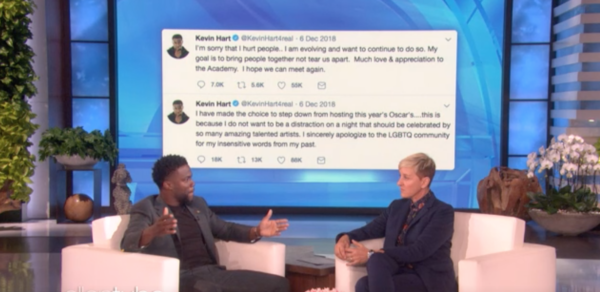
Finally, Hart said he walked away from hosting the Oscars because “I’d rather just say I’m sorry again and walk away because I’d much rather be done with the conversation. I don’t want to have this conversation anymore because I’m not that guy.”
The thing is—Hart has said almost these exact words about his admission of cheating on his pregnant wife—which he turned into a stand up joke —and considering domestic violence—on top of making fun of hitting women in his stand up act.
“Lying ruined my marriage,” the Washington Post reported Hart as saying in 2017. “That’s a lie, I cheated,” Hart said in his 2013 stand-up special “Kevin Hart: Let Me Explain.” “Yes, people, I cheated. Am I ashamed of it? No, I’m not,” he joked. “Do I wish I could take it back? No, no I don’t. Let me tell you why. You can’t evolve as a man if you never make a mistake. The only way that you can be perfect is to not f‑‑‑ up. I did it, I f‑‑‑ed up. Don’t cheat!”
Hart’s pronouncement seems to have a pattern: first complain on social media about rumors about him – in this case about being with a woman-not-his-wife in a sexually suggestive video. He then posted a meme on Instagram of him laughing at his phone captioned, ‘At the end of the day, you just gotta laugh at the BS.’”
Then go public, appearing to accept responsibility while still claiming to be the victim. Here Hart claimed he was being extorted—a claim disputed by the woman with him in the hotel room, represented by attorney Lisa Bloom. “I’m in a place in my life where I feel like I have a target on my back. And because of that, I should make smart decisions – and recently, I didn’t,” Hart then said, confessing to the affair and apologizing for something more than had been initially revealed.
BET noted in June 2017 that Hart is “known to be Hollywood’s most loyal family man, even when it comes to his divorce from ex-wife Torrei Hart” but admits that “he went through some pretty dark times with Torrie, including fights that turned violent.”
In an interview promoting the Jumanji: Welcome to the Jungle with Power 105.1 FM show The Breakfast Club. Kevin admitted: “Me and my ex wife. When it got violent where we’re fighting — Am I really fighting? Am I holding my hands up as if she’s a man right now? Oh my God. This is…I’m out. I’ve really got my hands up to not defend, but counter. Like, I’m waiting for you to throw a punch. ‘Cause I’m about to counter the s**t out of you. Like, I’m really that upset to where I have to get in a stance. When you get in a stance, that’s when I checked myself.”
Hart told the radio show that “he’s had “thick skin” about the negative media coverage surrounding the scandal,” but he told the radio show he was “upset” by some of the suggestions that his current wife allegedly breaking up his previous marriage.
So Hart is familiar with the machinations of internet trolls and social media rumor mongering. But somehow the current social media backlash over his history of homophobia is worse than those who went after his family—at least that’s what he appears to describe to Ellen DeGeneres.

There are always two sides to a story, Hart said, taking responsibility then asserting a conspiracy against him, telling DeGeneres:
“On my side, openly, openly, I say I’m wrong for my past words. I say it. I said it. I understand that. I know that. My kids know that when their dad messes up, I’m in front of it because I want to be an example so they know what to do.
In this case, it’s tough for me because it was an attack. This wasn’t an accident. This wasn’t a coincidence. It wasn’t a coincidence that the day after I received the job, that tweets just somehow manifested from 2008. Now, I don’t know who follows me and who doesn’t – I’m on social media everyday. I’ve got over 40,000 tweets. To go through 40,000 tweets to get back to 2008 – that’s an attack.
That’s a malicious attack on my character. That’s an attack to end me. That’s not just an attack to stop the Oscars. That’s what I want people to understand. That’s an attack to end me. Now I’m not going to get too emotional, but when you witness this, and you stand in front of it and you heard that these things exist – I’ve never experienced it – I’ve heard about it – this is my first time in the fire. I’ve seen it.
Oh my god, this was to destroy me. This was to end all partnerships, all brand relationships, all investment opportunities, studio relationships, my productions company and the people who work underneath me – this was to damage the lives of people who’ve been invested in me. It’s bigger than just the Oscars. It’s about the individuals that are out there now that are finding success and damaging your “celebrity.”
Now if you go back – and I don’t have a word or a bond – if I don’t have anything to stand on, I’m now going right back into the place where the people who came after me want me to go. Somebody has to take a stand against the “trolls” – you have to.”

But instead of asking questions about – as Billy Eichner pointed out – the “real truth, anger & fear” behind his anti-gay jokes and comments, DeGenerous chimed in about internet trolls and not letting “them” win. DeGenerous said:
“[T]hey’re going to win if you don’t host the Oscars. (Audience applause.) Then they win. So for you to stand up and say, ‘No, whoever you are, the trolls – and who knows who this person is or people – who cares? And you can’t let them destroy you and they can’t destroy you because you have too much talent. No one can do that.
And for them to stop you from your dream, from what you want to do and what you have a right to do – what you should be doing – that’s why they haven’t found another host. I think they were secretly hoping that you would come back and I’m praying that this happens.”
Then she appeared to remember, oh, yeah, she introduced the original film “Trevor” about gay teen suicide that led to the Trevor Project. And hate crimes and stuff:
“I think, as I said to you earlier, it’s perfect that all this happened because there has to be a conversation about homophobia, and whatever brought up and whatever they did and whoever’s trying to hurt you, it brought up you reminding people that you’re a bigger person. That you’ve already apologized. You’re apologizing again. (Applause) So, I mean, so as a gay person, as someone who actually
(Hart interrupts, pretending to be shocked: “What?”)
Yeah. (Laughs) – I’m so sorry to break this to you – I know. I didn’t tell you before….I didn’t want you to know. I thought maybe you wouldn’t like me. (Laughter) Um. I mean really, I am as sensitive to all of that and I talked to you about this and you’ve already expressed that’s it’s only – it’s not being educated on the subject. Not realizing how dangerous those words are. Not realizing how many kids are killed for being gay (Hart nods) or beaten up every day. You have grown. You have apologized. You’re apologizing again right now. You’ve done it. Don’t let those people win. Host the Oscars.”
Hart said he stepped away to not become the focus of the Oscars when so many people had worked so hard to get there. But DeGeneres would have none of that:
The night should be about you….What we’re going to get to see on stage with you hosting the Oscars is sophistication, class, hilarity, and you growing as a person because most people would say, ‘you know I’m walking away, I’m not coming back because I’m going to go back and forth.’ But for you to be the bigger man, for you to say ‘I understand’ and to not pay attention—there are so many haters out there. Whatever’s going on on the Internet, don’t pay attention to them. That’s a small group of people being very, very loud. We are a huge group of people who love you and want to see you host the Oscars.” (big cheers)
Why didn’t DeGeneres ask: it’s 2019—why do you still need to grow and be educated about homophobia? Have you ever heard of the It Get’s Better Project? Even President Obama did a video.
A backlash ensued immediately on websites and social media.
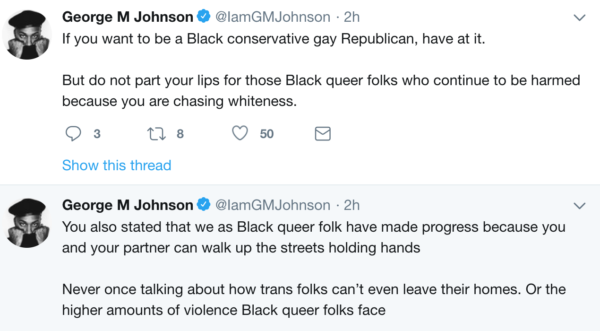

That DeGeneres is sometimes tone deaf is not new. During the fight against Prop 8, the California initiative that took away the right to marriage equality for same sex couples in that state in 2008, DeGeneres contributed $1 million to an animal-related initiative but nothing to the battle to fight Prop 8. That while tabloids reported on the sale of those images of her wedding to Portia de Rossi that August.
The expose in IN Los Angeles magazine prompted a backlash, including three groups that formed on Facebook encouraging her to donate and several celebrity contributions.
“It’s not as if DeGeneres has not been out there stating her opposition to Proposition 8. She has on her blog, and in an appearance on ‘The Tonight Show with Jay Leno.’ She has talked about her marriage to Portia de Rossi on her daytime show, which perhaps did more to positively present the idea of same-sex nuptials to ‘traditional’ households than a thirty-second spot could have done,” Variety’s Ted Johnson wrote at the time. “What is perplexing is why, given the hubbub, she doesn’t just write a check. It may be a testament to why stars employ political and philanthropic consultants — to avoid these types of pitfalls in the public sphere.”
In this case, it looks like DeGeneres and Hart just had dinner together and decided that her forgiving him publicly on behalf of the LGBT community would get him reinstated. Maybe. But the two millionaires might have considered who the real “victims” are here, in this age of rising hate crimes inspired by the anti-LGBT world of Donald Trump. Now that really is bigger than the Oscars!

“From when this news first broke, GLAAD said Kevin Hart should not step down from the Oscars, he should step up and send an unequivocal message of acceptance to LGBTQ youth that matches the force and impact of his initial anti-LGBTQ remarks,” said GLAAD President and CEO Sarah Kate Ellis, who is scheduled to appear on CNN Tonight with Don Lemon Friday night to discuss the situation in more detail.
A nerve has been struck. Has Kevin Hart changed and if he has—where’s he been when so many could be helped, not hurt, by his voice?
Brazil
US lists transgender Brazilian congresswoman’s gender as ‘male’ on visa
Erika Hilton has represented São Paulo since 2022

A transgender Brazilian congresswoman says the U.S. issued her a visa that listed her gender as “male.”
Erika Hilton on Wednesday wrote on her Instagram page that she requested a visa that would have allowed her to travel to the U.S. in order to participate in the Brazil Conference at Harvard University and the Massachusetts Institute of Technology.
The conference took place earlier this month.
“I was classified as ‘male’ by the U.S. government when I went to get my visa,” wrote Hilton, who added a visa she received from the U.S. in 2023 listed her gender as “female.”
Hilton is a Black travesti and former sex worker from São Paulo who won a seat in the Brazilian Congress in 2022. The Washington Blade spoke with Hilton shortly after her election.
“It is a big responsibility … but I feel very honored,” said Hilton. “I very much like to be able to be a representative for my people, and the more than 250,000 people who voted for me have confidence in me,” she said after she spoke at a rally in support of now Brazilian President Luiz Inácio Lula da Silva in a São Paulo square. “This demonstrates that our work has the potential to have a gigantic reach; where we can advance efforts to end death, poverty, misery, genocide that we have.”
President Donald Trump in his inaugural speech announced the federal government’s “official policy” is “there are only two genders, male and female.” The Trump-Vance administration has also banned the State Department from issuing passports with “X” gender markers.
Germany and Denmark are among the countries that have issued travel advisories for trans and nonbinary people who plan to visit the U.S. These warnings come ahead of WorldPride, which is scheduled to take place in D.C. from May 17-June 8.
Hilton said she is “not surprised” the U.S. issued her a visa with a male gender marker.
“I’m also not surprised by the level of hatred and fixation these people have with trans people,” she said. “After all, the documents I presented are rectified, and I’m registered as a woman, even on my birth certificate.”
Hilton further accused the U.S. of “ignoring official documents from other sovereign nations, even from a diplomatic representative.”
“At the end of the day, I’m a Brazilian citizen, and my rights are guaranteed and my existence is respected by our own constitution, legislation, and jurisprudence,” she said.
Editor’s note: Duda Salabert, another transgender Brazilian congresswoman, also said the U.S. listed her gender as “male” on her American visa.
National
Discredited former cop played ‘key role’ in deportation of gay make-up artist
Former police officer claimed that Andry Hernandez Romero was a member of Venezuelan gang ‘Tren de Aragua’

A new investigation points to a discredited, former police officer who played a “key role” in the wrongful deportation of Andry Hernández Romero, a gay asylum seeker and make-up artist who was sent to a prison in El Salvador under Trump’s Alien Enemies Act.
USA Today found in a recent investigation that the former Milwaukee police officer who filed the report about Hernández Romero, citing his tattoos as the reason for the alleged gang affiliation, has a long history of credibility and disciplinary issues in his former police officer position.
The private prison employee who previously worked as a police officer until he was fired for driving into a house while intoxicated—among other alcohol-related incidents—“helped seal the fate,” of Hernández Romero.
The investigation by USA Today found that the former police officer accused Hernández Romero of being a part of the Tren de Aragua gang because of Romero’s two crown tattoos with the words “mom,” and “dad,” which are now being identified as Venezuelan gang-related symbols.
Since then, his story has made headlines across the nation because Hernández Romero not only has no criminal record, but is legally seeking asylum in the U.S. due to credible threats of violence against him in Venezuela because of LGBTQ persecution.
He was targeted shortly after Trump invoked the Alien Enemies Act of 1798, which is a proclamation for all law enforcement officials to “apprehend, restrain, secure and remove every Alien Enemy described in section 1 of [the] proclamation.”
Charles Cross Jr., the former police officer, signed the report that wrongfully identified Hernández Romero as a gang member. Cross was fired in 2012 after many incidents relating to his credibility and how it was affecting the credibility of the Milwaukee Police Department to testify in court.
He had already been under investigation previously for claiming overtime pay that he never earned. In 2007, he had faced criminal charges for damage to property, according to court records.
In March, The Washington Blade spoke with the Immigrant Defenders Law Center Litigation and Advocacy Director Alvaro M. Huerta regarding the case who stated that “officials with U.S. Immigration and Customs Enforcement and U.S. Customs and Border Protection alleged his organization’s client was a member of Tren de Aragua, a Venezuela-based gang, because of his tattoos and no other information.”
Hernandez Romero came to the United States last year in search of asylum and now makes up one of 238 Venezuelan immigrants who were deported from the U.S. to El Salvador, Honduras and Venezuela. Many of those being deported are being sent to the Center for Terrorism Confinement, a maximum-security mega-prison in El Salvador, which has been accused of human rights violations.
According to the investigation, the Department of Homeland Security “wouldn’t offer further details on the case, or the process in general, but reiterated that the department uses more than just tattoos to determine gang allegiance.”
His story is now being looked at as a cautionary tale for the lack of due process the U.S. government is taking, as the Department of Homeland Security (DHS) and Immigration and Customs Enforcement (ICE) ramp up deportations across the nation.
Organizations like the Human Rights Campaign are now calling for Secretary of State Marco Rubio and Secretary of Homeland Security Kristi Noem to cease wrongful deportations and return Hernández Romero home. The petition also urges the U.S. government to afford all Americans, including nationals and asylum seekers residing in the U.S., due process of law as required by the Constitution.
California
South Park provides green space to a predominantly Latino community
‘…the need for green spaces within Latino communities has never been greater, especially in South L.A.

South Park, one of the oldest parks in Historic South Central, has brought multi-generational Angelenos together for centuries.
The park sits at the intersection of 51st Street and Avalon Blvd, surrounded by some of the most socially, culturally and historically important locations in the country, including Central Avenue, site of the West Coast jazz scene in in the 30s and 40s, the former Black Panther Party headquarters in L.A and one of the epicenters of the Watts rebellion in 1965.
The park—also known as Barry White Park—was founded in 1899. Today, 126 years later, the park still stands—hosting weekend soccer games, señoras chismeando, recreational activities like swimming, card games among elders and city-led events.
The park was named after two-time Grammy Award winner and R&B singer Barry White, who grew up in South Central, just blocks away from the park.
As PBS initially reported, the City of Los Angeles purchased it from a private developer for $10,000. At that time it was not as big as it is now, but was always characterized by its tall palm trees.
The park is located in Los Angeles City Council District 9, where the population is predominantly Latino (79.9%). According to Park Equity, Life Expectancy and Power Building research, the need for green spaces within Latino communities has never been greater, especially in South L.A, where the landscape is often characterized by an overconcentration of liquor stores and a lack of quality and accessible recreational spaces. More than a century after the park’s opening, for many local residents, it is one of the only parks within walking distance for them.
Amanda Walker, 56, moved to L.A. from Chicago, Illinois. She said one of her favorite things to do at the park is to take in the sun.
“The sun falls perfectly anywhere through the park, that’s probably my favorite part,” Walker said.
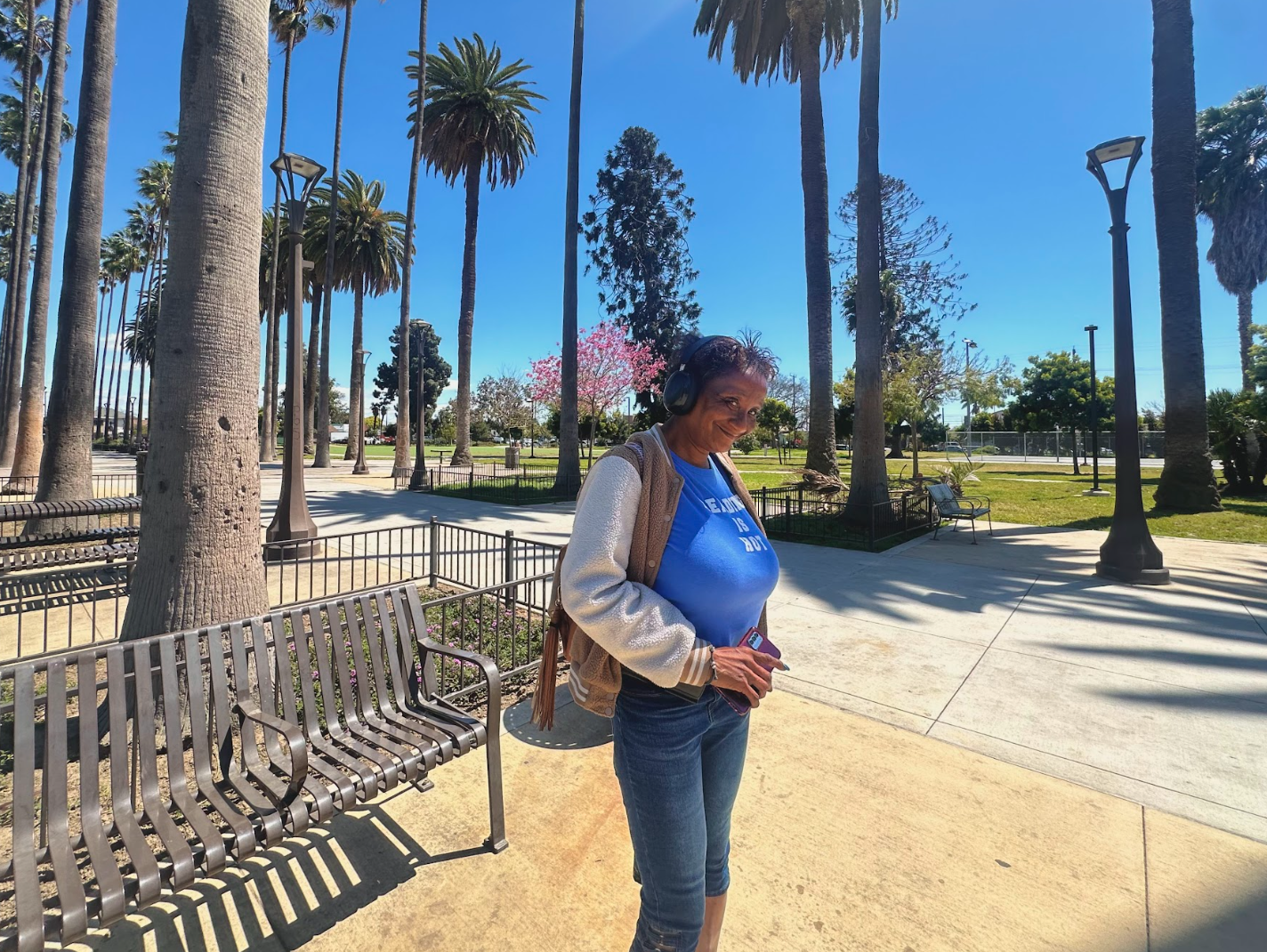
Amanda Walker at the park before meeting up with her friends. (Photo by Brenda Verano)
Walker said she loves coming to the park with her friends, who often use the park as a gathering place.
“I do wish there were more activities for adults,” she said. “The park has a playground for kids, and basketball courts… we need more things in the park for people like me.”
Maria L., 30, said she also comes to the park to be surrounded by nature. Although she lives in South Central, she said she does not have much free time to come as often as she would like.
“I haven’t been here in about eight months,” she said. Although she was alone, she was on a video call with her family where she was able to show them the scenery of the park and said she was surprised at how green and vibrant it all looked.
“I like coming here to just sit and hang out,” she said. She enjoys the sense of community she feels when being in the park. “Some people are walking their dogs; others are exercising or simply just laying down. It’s nice. I also like seeing the birds and the squirrels,” she said.
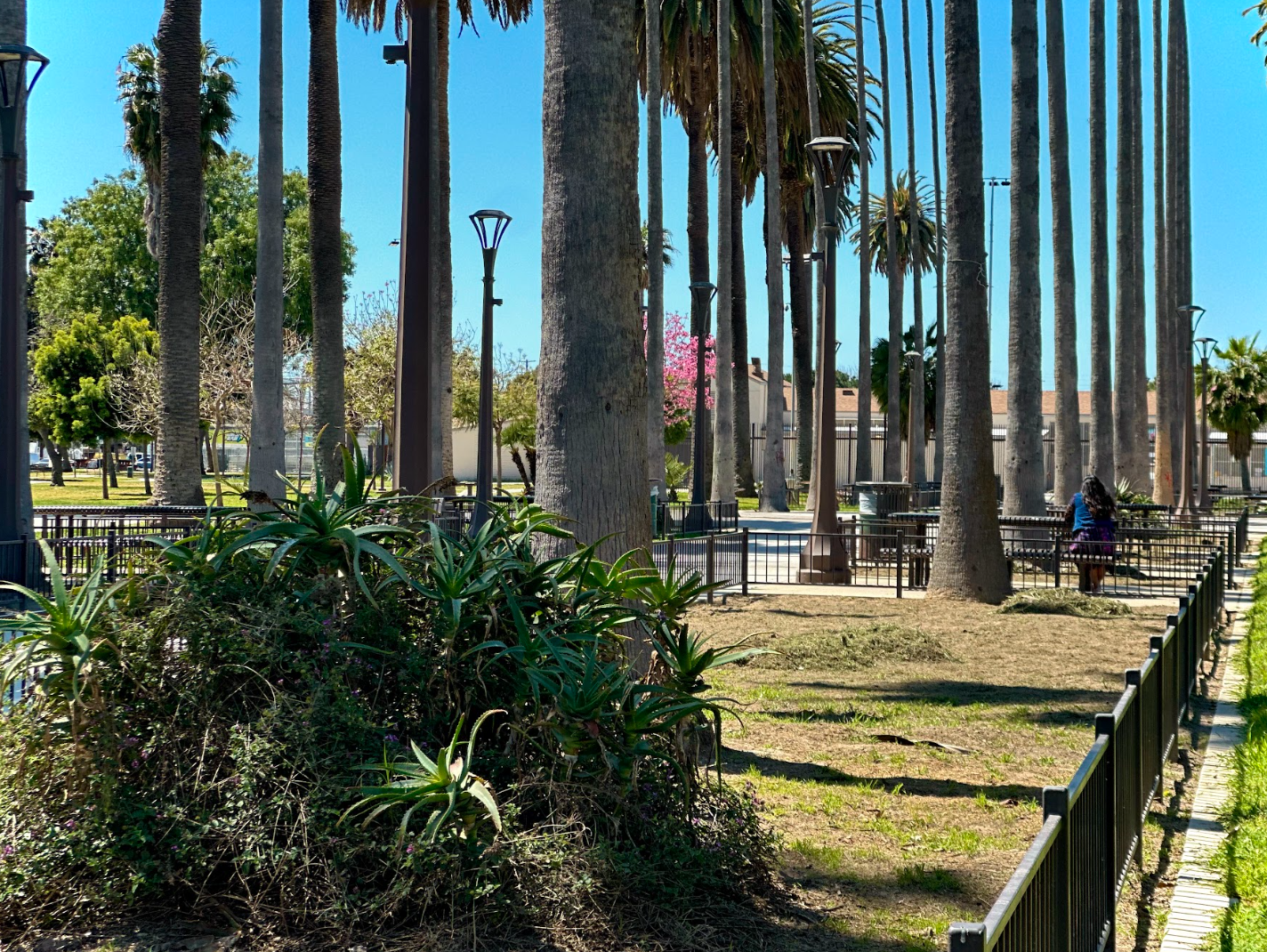
From a distance, Maria L. sits in the sun on the park benches. (Photo by Brenda Verano)
The relationship between access to parks and life expectancy are closely linked. Park deserts can have disastrous effects on residents as well as wildlife, as stated by a study conducted by the Prevention Institute in partnership with University of California, Los Angeles , the National Health Foundation, Community Coalition, Esperanza Community Housing Corporation and the Social Justice Learning Institute.
According to the research, South Central L.A. is considered to have “high park need” and “very high park need” neighborhoods, with an average of 1.6 and 0.7 acres of parkland per 1,000 residents, in comparison to the L.A. countywide average, which is 3.3 acres of parkland per 1,000 residents. The median life expectancy in South L.A. is 77 years, well below the level for the county as a whole. About 15 miles away, in the community of Beverly Hills, the life expectancy is about 90 years, 13 years higher.
South Central residents have been asking for more investment in parks and recreational facilities. In 2018, the 18.25-acre park went through a multi-million renovation, which allocated funding for the improvement of its gym, swimming pool, basketball and tennis courts, baseball diamond, outdoor stage, fitness area, picnic tables and children’s play area.
Despite the recent investments, the park has also been widely known for its gang and chrome activity, which the community says has been a direct effect of years of disinvestment and neglect.
In previous years, the Los Angeles Police Department identified the park as an area where gang activity—specifically from the Avalon Gangster Crips, Broadway Gangster Crips and 52nd Street Playboys—has been observed.
“The problem was scanned and revealed that this park, like many others in urban America, had slowly been neglected and overrun by criminal activity that revolved around gangs, narcotics and quality of life issues,” states the LAPD. “The analysis of the problem at the park was conducted by reviewing data, meeting with officers and receiving input from local community representatives and park staff members.”
Despite this, the community recognized the park as a long-standing historical entity of South Central L.A.
As one of the oldest parks in the city, South L.A. Park continues to be home to local residents, wildlife, street vendors, youth and all the great things that make up Los Angeles.
EDITORS NOTE: This article was published through the Bezos Fellowship grant provided by the Ethnic Media Services, which recently changed its name to American Community Media. The article was written by Brenda Fernanda Verano, an award-winning journalist who reports for CALÓ News, a local non-profit newsroom focusing on the Latin American community of Los Angeles.
Myanmar
LGBTQ+ advocacy group joins Myanmar earthquake relief effort
March 28 quake killed thousands, devastated country’s second-largest city

A powerful earthquake that rocked Myanmar on March 28 unleashed devastation across the central part of the country.
The U.S. Geological Survey measured the quake at 7.7, and pinpointing its epicenter roughly 10 miles west of Mandalay, the country’s second-largest city. A 6.4-magnitude aftershock jolted the area 12 minutes later, compounding the destruction and deepening the crisis for a nation already strained by conflict.
The earthquake struck with terrifying intensity near its epicenter, wreaking havoc on Mandalay and the nearby city of Sagaing.
Mandalay, a bustling city of approximately 1.5 million residents, bore the brunt of the destruction. Among the most striking losses was the 12-story Sky Villa Condominium, which collapsed, leaving scores trapped beneath the wreckage. Rescue workers scrambled to pull survivors from the rubble, but the rising death toll underscored the tragedy’s magnitude.
In Sagaing, which is located closer to the epicenter, more than 70 percent of buildings sustained damage. The Ava Bridge, an essential artery spanning the Irrawaddy River, collapsed, cutting off a critical connection to Mandalay. The earthquake’s shallow depth of less than seven miles amplified its power, reducing homes, temples, and schools to rubble.
The earthquake’s death toll continues to climb, with at least 3,649 confirmed dead, more than 5,000 injured, and approximately 145 people missing. Amid the widespread devastation, questions loom about the impact on vulnerable populations. The Los Angeles Blade reached out to Colors Rainbow, an organization advocating for LGBTQ+ rights in Myanmar, to understand how the crisis has affected one of the nation’s most marginalized communities.
Colors Rainbow Executive Director Hla Myat Tun spoke about how his organization is working to address the crisis faced by Myanmar’s LGBTQ+ community in the aftermath of the earthquake.
Colors Rainbow has implemented a system of multipurpose cash transfers, directing funds to local LGBTQ+ partner organizations. These grassroots partners, in turn, provide essential support to affected individuals that includes emergency cash assistance, food, non-food items, clean water, and basic emotional support tailored to the immediate needs of their communities.
“We estimate that around 500–800 LGBTQ individuals have been impacted in the affected areas, particularly in Mandalay Region, Sagaing Region, and southern Shan state,” said Hla Myat Tun. “So far, we have been able to directly assist around 80–100 LGBTQ individuals.”
Hla Myat Tun told the Blade that Colors Rainbow is actively gathering data to assess the specific challenges that LGBTQ+ people are facing in the aftermath of the earthquake.
Preliminary observations, he noted, point to heightened vulnerability among LGBTQ+ people, driven by social exclusion and limited access to mainstream humanitarian aid. Hla Myat Tun, however, emphasized more comprehensive information is necessary to fully understand the scope of their needs and vulnerabilities in this crisis.
“We are partnering with international LGBTQ and feminist organizations that focus on displaced communities,” said Hla Myat Tun. “These partners provide emergency funds, and we coordinate with local LGBTQ groups to deliver aid directly to affected individuals on the ground.”
Addressing reports of military restrictions on humanitarian aid, Hla Myat Tun explained how Colors Rainbow is managing to reach LGBTQ+ people who are in conflict zones and areas the military junta controls. Hla Myat Tun highlighted the importance of the organization’s trusted local LGBTQ+ partners, who are embedded in these regions. Their presence and established networks, he said, are vital in navigating restricted areas and ensuring that aid reaches the LGBTQ+ people who are most in need.
Hla Myat Tun also provided insight into how Colors Rainbow is tailoring its relief efforts to meet the LGBTQ+ community’s specific needs.
He said his organization is gathering information directly from LGBTQ+ people through close coordination with its local partners, relying on both formal and informal communication channels. Hla Myat Tun told the Blade his team conducts daily check-ins via quick telephone calls, ensuring a continuous flow of information to guide their response efforts despite limited internet access, electricity and other challenges.
“Our approach is collaborative — we set strategies and share responsibilities to respond flexibly and safely, based on the rapidly changing local context,” he said. “Personal stories are being documented, but for security reasons, we are cautious about sharing them publicly.”
When asked whether staff or volunteers had harassment, discrimination, or violence while delivering aid — a concern given the precarious legal and social climate for LGBTQ+ people in Myanmar — Hla Myat Tun said there have been no reported incidents thus far.
“So far, we haven’t received any reports from our staff or local partners about harassment or violence while delivering aid,” he noted, emphasizing Colors Rainbow remains vigilant and has implemented robust safety protocols to protect all involved.
Colors Rainbow relies primarily on funding from international LGBTQ+-focused partners. He noted, however, humanitarian funding specifically dedicated to LGBTQ+ communities remains vastly under-resourced, relative to the pressing needs on the ground. Hla Myat Tun said this shortfall severely limits the scale and reach of Colors Rainbow’s efforts.
“While Myanmar’s legal framework remains outdated, societal attitudes — especially during the civilian government — have shown signs of progress,” said Hla Myat Tun. “We have seen positive change thanks to the work of local LGBTQ organizations.”
“In the current crisis, many communities are working together despite legal barriers. However, in areas without LGBTQ-led organizations, inclusive humanitarian responses are still lacking,” he added. “There’s an urgent need for international humanitarian actors to understand and implement LGBTQ-inclusive practices in Myanmar.”
When asked about long-term strategies to support the recovery and resilience of LGBTQ+ communities as Myanmar rebuilds, Hla Myat Tun affirmed Colors Rainbow is deeply committed to fostering resilience. The organization’s initiatives include leadership development, community empowerment through training and workshops, sub-granting programs, and organizational development support. He also highlighted Colors Rainbow’s advocacy for LGBTQ+-inclusive policies and collaboration with ethnic groups to promote an inclusive federal democracy, and specifically thanked Outright International, a global LGBTQ+ and intersex rights group, for “amplifying our work.
“This kind of international attention shines a spotlight on the challenges LGBTQ communities in Myanmar are facing and helps open doors for more support,” Hla Myat Tun told the Blade. “It also boosts visibility and solidarity, both locally and globally, which we deeply appreciate.”
Arts & Entertainment
LA Opera brings back Pride Night with a production of ‘Ainadamar’
Pride Night returns at the LA Opera

LA Opera is bringing back its Pride Night on Wednesday May 7, in partnership with the Opera League of Los Angeles.
LGBTQ members and allies will come together for Pride Night to indulge in a performance of “Ainadamar,” at the Dorothy Chandler Pavillion. The discounted tickets for Pride Night include access to a complimentary post-show party at Vespaio hosted by the Opera League of Los Angeles, featuring Cal-Italian bites from Chef Agostino Sciandri.
“Ainadamar” is a tribute to Spanish poet and queer icon, Federico García Lorca.
“This season, we celebrate with ‘Ainadamar,’ a powerful tribute to Spanish poet and queer icon Federico García Lorca. These pairings matter. They highlight that opera is a living, evolving art form—one that speaks to all people and reflects the diversity of the world we live in,” said Christopher Koelsch, president and CEO of LA Opera.
The central plot of “Ainadamar,” which is the Arabic meaning for ‘fountain of tears,’ follows Ana María Martínez as Margarita Xirgu, an actress who spent half of her career portraying Mariana Pineda, who was a 19th-century Spanish liberalist heroine, in Lorca’s play. Pineda was a political martyr who was executed for embroidering a flag with the slogan “Equality, Freedom and Law,” in protest of the absolutist Spanish regime.
The production, running at approximately one hour and 20 minutes, sets the stage with a throwback, recounting Lorca’s life and his last days in the Spanish Civil War.
“At the heart of our Pride Night celebration is the belief that everyone should feel seen onstage and off. Opera is a space for community and belonging, where our audiences can recognize themselves not only among fellow attendees, but also in our artists, our music and the stories we tell,” said Koelsch.
This major company premiere, led by resident conductor Lina Gonzáles-Granados, is sung in Spanish, with English and Spanish subtitles. Grammy-winning composer Osvaldo Golijov produces the dramatic, flamenco-inspired score that meets the poignant libretto by David Henry Hwang.
During the COVID-19 shutdowns, live performances at the LA Opera were put on hold and the journey to bring back Pride Night, among many other in-person performances, was a struggle filled with many moving parts.
“COVID-19 suspended live performances across the board and during our return season we were navigating the different timelines for audiences returning to live theater. It was very much a matter of listening to our community and learning what had changed for them as well as us: some opted for livestream options, others preferred only outdoor events, and so on,” said Koelsch. “Once we found our stride, we were excited to bring back Pride Night the following season during ‘The Marriage of Figaro.’”
This year the LA Opera is celebrating their 40th anniversary by launching their 40th Anniversary Campaign to raise resources needed to continue funding their organization.The show opens on Saturday, April 26 and runs through May 18. Purchase tickets by clicking here.
Argentina
Argentina’s transgender community confronts ‘chaotic, desperate’ situation
President Javier Milei has implemented several anti-trans directives

Editor’s note: Washington Blade International News Editor Michael K. Lavers will be on assignment in Argentina through April 12.
BUENOS AIRES, Argentina — A group of Argentine transgender activists with whom the Blade spoke on April 4 said President Javier Milei’s policies have made their community even more vulnerable to violence, discrimination, and poverty.
“The situation is really chaotic, desperate,” said Florencia Guimares García, a travesti activist who is president of the House of Lohana and Diana Civil Association. “There is also a lot of fear among the trans and travestí community towards the government’s policies.”
Guimares’s group is named after Diana Sacayán, a prominent trans activist who was stabbed to death inside her Buenos Aires apartment in 2015, and Lohana Berkins, the founder of the Association for the Fight for Travesti and Transsexual Identity who died in 2016.
Guimares and three other trans activists — Julia Amore, Sasha Solano, and Daniela Ruiz — spoke with the Blade after they participated in a trans and travestí rights forum that took place at an LGBTQ cultural center in downtown Buenos Aires. Alba Rueda, the country’s former special envoy for LGBTQ rights, also took part.
“We are in a bad moment for the rights and quality of life of LGBTQ+ people,” Rueda told the Blade during a February 2024 interview.

Milei took office on Dec. 10, 2023, after he defeated then-Economy Minister Sergio Massa in the second round of that year’s Argentina’s presidential election. Rueda resigned before Milei assumed the presidency.
Milei, an economist and former congressman, shortly after he took office eliminated the country’s Women, Gender and Diversity Ministry.
Milei last year closed the National Institute Against Discrimination, Xenophobia and Racism, a government agency known by the acronym INADI that provided support and resources to people who suffered discrimination based on sexual orientation, gender identity, and other factors. Milei in 2024 also dismissed trans people who the government hired under the Trans Labor Quota Law, which set aside at least 1 percent of public sector jobs for trans people.
Argentina’s landmark Gender Identity Law that, among other things, allows trans and nonbinary people to legally change their gender without medical intervention, took effect in 2012 when Cristina Fernández de Kirchner was president. Milei on Feb. 5 issued a decree that restricts minors’ access to gender-affirming surgeries and hormone treatments.
Gay Congressman Esteban Paulón, a long-time LGBTQ activist, filed a criminal complaint against Milei after he linked the LGBTQ community to pedophilia and made other homophobic and transphobic comments during a Jan. 23 speech at the World Economic Forum in Davos, Switzerland. Millions of people in Buenos Aires and across Argentina participated in marches against Milei that took place less than two weeks later.

Milei is among the heads of state who attended President Donald Trump’s inauguration. Milei also spoke at this year’s Conservative Political Action Conference in National Harbor, Md.
“Violence is more explicit, more common,” Guimares told the Blade, noting police violence has become more common against sex workers who are trans or travestí since Milei took office. Guimares added this situation is worse outside of Buenos Aires.
“The situation is different, depending on the location, and even more so in other provinces,” she said. “Even living in the province of Buenos Aires isn’t the same as living in Salta, or in Jujuy, or in Corrientes, or in provinces where the population is more conservative, where the discourse from the churches is much stronger, where all of this has a much crueler impact.”
“Milei’s discourse has legitimatized all of this,” added Guimares.
Amore said Argentina before Milei “had been a beacon” for human rights around the world.
“We’ve been building these laws with a lot of struggle, a lot of effort, with allies, and it wasn’t enough because we didn’t reach our goal,” she said. “These are very young. Our democracy is very young; we have a 40-year-old democracy and we are talking about a Gender Identity Law that is 12-years-old.
Amore added Milei is trying to erase trans and travestí people. Ruiz, an activist and actress who founded Siete Colores Diversidad, agreed.
“It is a cultural battle for us,” Ruiz told the Blade, referring for the continued struggle for trans and travestí rights in Argentina.
“It marks a cultural paradigm shift that we were carrying out day after day, making ourselves visible,” she added. “We carried it out by making ourselves politically visible, by presenting our travestí and trans Latin American visibility as a beacon to the world.”
The activists spoke with the Blade less than three months after Trump took office.
The American president, like Milei, has targeted the trans community with executive orders and policy directives. These include banning the State Department from issuing passports with “X” gender markers and prohibiting trans adults and young people from sports teams that correspond with their gender identity.
Solana, a trans woman from Peru who advocates on behalf of migrants, noted one of the first executive orders that Trump signed directed the federal government to only recognize two genders: Male and female.
“Man and woman. Period,” she said.
Guimares added Milei’s anti-LGBTQ discourse isn’t even his “original speech, but rather a line drawn from the U.S. government of Donald Trump and its agenda, which he established from the beginning and which he campaigned on as well.”
“This also follows in line with parties like Vox in Spain and other European countries, where we see how in Hungary, where an LGBTI Pride march (in Budapest) is now banned, and in other countries around the world where the population is having a really hard time,” said Guimares. “So, it’s not something original from Milei, but rather he’s taking part in those political agendas to generate strategies and alliances to be able to access economic resources.”
Amore, for her part, urged her American counterparts to continue the fight.
“Don’t let down your guard,” said Amore. “Organize. Come together. Speak out. Become visible in community. Respect the diversity of voices and put your own voices first and make yourselves more visible.”
a&e features
Meet the chef who built his legacy in the LGBTQ+ community
He is an icon in the Hollywood culinary scene and a fierce ally in the LGBTQ community

Editor’s note: The interview with Chef Juan featured in this article was done in Spanish and translated accordingly for this article, but kept in its original format.
Juan Raigosa Chavez is the living embodiment of the American dream that many can only hope for. During his 40-year culinary journey, he was able to become a legal citizen and has enjoyed the privileges of living and working in Los Angeles for four decades.
Chef Juan migrated here from Zacatecas, Mexico in 1985 and since then he has worked his way up to his current position as one of West Hollywood’s most beloved chefs in the LGBTQ+ bar scene.
He started his journey as a dishwasher and through his hard work, dedication to achieving the American dream and meticulous work ethic, he was able to climb the ranks in the kitchen team hierarchy.
“Primero empecé lavando platos en 1985 en Marix Tex Mex [Café] en Hollywood. Y después me hice preparador, después me hice cocinero. Y luego me hicieron kitchen manager, primero de Marix y luego de Basix Café haciendo creatividad de menús, variedad de comida, y más,” nos dice Chef Juan. “Me mandaron a las mejores escuelas culinarias de San Francisco pagados por la dueña de Basix.”
“First, I started washing dishes in 1985 at Marix Tex Mex [Café] in Hollywood. Then, I was promoted to food prep, then kitchen cook. Finally, I became kitchen manager—first at Marix and then an Basix Café—creating menus and a variety of dishes,” said Chef Juan. “[The restaurant owners] sent me to the best culinary schools in San Francisco, all paid for by the owners.”
Chef Juan was living the American dream and had worked very hard to get to the position he was in when Covid-19 hit and many restaurants, including both Marix and Basix were forced to close. As of earlier this year, it seems like Marix Tex Mex Café is apparently set to re-open at the same location, while the location Basix was in, is still up for lease.
WeHo times first reported that workers have been adding finishing touches to the exterior of the building, but the significant delay in re-opening is due to extensive water damage that happened while the location was closed.
“Mucha gente lloró, porque teníamos más de cuarenta personas a mi cargo allí,” recalls Chef Juan.
“A lot of people cried because there were over forty people who worked under my leadership during that time,” said Chef Juan.
He was laid-off for two years and then when he stopped receiving federal assistance, he uploaded his resume online and the previous owners of GymBar WeHo, immediately called him up to hire him as their chef.
During his time at Marix and Basix, he says he gained a lot of valuable experience and gained a deep respect for the rich and diverse community of Hollywood.
Within three days of uploading his resume, he was hired.
“No duraron ni tres días cuando ya estaba contratado por que, como te dire–me hice un poco famoso,” Chef Juan tells the Los Angeles Blade. “Muchos de la ‘community’ me reconocen.”
“Not even three days passed until I was fully hired, because how do I say this? I guess I got a little bit famous,” Chef Juan tells the Los Angeles Blade. “A lot of people in the community recognize me.”
At that moment, a patron from the restaurant kindly interrupted the interview to say goodbye to Chef Juan and thank him for the food.
“Si ves, siempre me saludan porque me conocen y saben quién soy,” nos dice Chef Juan.
“See? People always say hello to me because they recognize me and know who I am,” Chef Juan tells us.
He also tells us that many people who know that he started working at GymBar have asked him to recreate some of his famous dishes from when he worked at Marix and Basix.
Chef Juan says his favorite part about working in a kitchen is his ability and freedom to create new dishes and elevate recipes that have always been staple dishes in his life and culture.
Due to his heartwarming attitude, friendly face and incomparable work ethic, he is now a sought-after chef and iconic member of the Hollywood community.
“Bastante gente me ha buscado desde que empecé aquí,” said Chef Juan.
“Plenty of people have looked for me here since I started,” said Chef Juan.
When asked how he wins over new customers, he said he likes to start off by asking customers what their favorite dishes are and then he builds on that until he’s able to find something that they are excited to try.
He spoke passionately about how much he loves to win over new customers and continue to impress his loyal customers. He says that to avoid mistakes, he likes to personally train each person who works under him, saying this is how he ensures the quality of the food is consistently to his standards.
“Es hacer las cosas con amor—porque cuando estás enojado no te va a salir bien—la comida te sale perfecta,” said Chef Juan.
“It’s about doing everything with love so it comes out perfect, because when you’re angry, nothing will taste right,” said Chef Juan.
It goes without saying that he is an icon and when we asked him how he felt about his entire career and legacy being built around the LGBTQ+ community of West Hollywood as a Latin American person, his answer was heartwarming.
“I love my people of West Hollywood, my neighborhood and for me it’s all normal,” said Chef Juan in both English and Spanish. “For many people, I understand it’s scary, but I understand [them] and I love my people no matter what they do.”
Chef Juan continues his legacy as he celebrates his 40th year, now working at WeHo’s GymBar, which is run by one of the Dodgers executive’s, along with his husband. As an avid Dodger fan, Chef Juan has also had the opportunity to participate in cooking demonstrations led by chefs at Dodger Stadium. GymBar WeHo is actually one of the only other locations in LA—other than Dodger Stadium that sells the authentic Dodger Dog.
Now that baseball season is underway, Chef Juan invites everyone in the nearby communities to join them for a game and a Dodger Dog.
Local
New chapter: P3 Theatre Company moves to Los Angeles
P3 Theatre Company, a long-standing staple in Long Beach’s theatre scene, has officially relocated to Los Angeles.

P3 Theatre Company, a long-standing staple in Long Beach’s theatre scene, has officially relocated to Los Angeles. While the company remains close to its Long Beach roots, this move signals a fresh chapter and opportunity to connect to a broader audience.
Jon Peterson, Executive Director and Founder of P3 Theatre Company, discusses the transition.
“After the pandemic lifted, the venue we were renting in Long Beach was no longer available to us,” explained Peterson. “After some time, we decided to look in the Greater Los Angeles area. There are so many great venues available, and there’s definitely a huge demand for the arts.”
P3 Theatre’s first major production in Los Angeles will be “Day After Day” (The Life and Music of Doris Day), a sentimental and nostalgic celebration of the legendary singer and actress. The choice to revive this show was intentional — it was P3’s last production before the Covid-19 shutdown.
“‘Day After Day ‘ was a very successful production,” said Peterson, noting that it earned Deborah Robin the Best Performer in a Musical title at the Orange County Theatre Guild Awards. “It’s such an endearing show with tons of recognizable music and the dynamic story of Doris Day.”
While dazzling performances are integral to P3’s mission, the company is equally committed to community outreach. Peterson emphasized that the move to the West Hollywood and Hollywood areas, offer opportunities to collaborate with other nonprofits and expand access to the arts for marginalized groups.
“There is a huge demand for the arts in this region,” said Peterson. “We look forward to bringing shows that audiences are excited to see, as well as introducing new works that will enhance their theatrical experience.”
One of P3’s signature initiatives is P3 Educates+, a program designed to provide performing arts workshops to underserved communities. Catering to all ages – which Peterson describes as 0-100+ – the workshops include improvisation, acting, and singing.
“It provides more than just an education of theatre,” Peterson explained. “[It provides] a level of entertainment that marginalized communities may not have an opportunity to experience otherwise.”
Supporting LGBTQ+ stories and artists is also a core priority for P3 Theatre Company. Peterson highlighted the company’s commitment to producing both new LGBTQ+ works and celebrated classics.
“Our stories need to be told and heard,” Peterson emphasized. “What better way to do so than through the arts?”
Among P3’s proudest achievements are the world premieres of two acclaimed works by playwright Jiggs Burgess. The Red Suitcase won the prestigious Del Shores Playwright Competition, while Wounded earned multiple awards at the Hollywood Fringe Festival in 2023. The latter’s success secured an off-Broadway run at Soho Playhouse in New York City, with performances continuing in 2024 and 2025.
P3 Theatre Company has ambitious long-term goals for its future in Los Angeles. Peterson hopes to build a strong audience and donor base while eventually securing a permanent performance space.
“P3 Theatre Company’s long term goal is to grow a solid audience and donor base in Los Angeles – and to find ‘the perfect theatre’ to hang our hat in.” Peterson said. “It is our plan to call Los Angeles our home and to continue to produce professional theatre in a community where theatre is thriving.”
For those eager to experience P3’s return to the stage, tickets for Day After Day (The Life and Music of Doris Day) are now available. As Peterson says with confidence, “We know the audiences will love it!”

For more information about P3, head to www.p3theatre.biz
Federal Government
USCIS announces it now only recognizes ‘two biological sexes’
Immigration agency announced it has implemented Trump executive order

U.S. Citizenship and Immigration Services on Wednesday announced it now only “recognizes two biological sexes, male and female.”
A press release notes this change to its policies is “consistent with” the “Defending Women from Gender Ideology Extremism and Restoring Biological Truth to the Federal Government” executive order that President Donald Trump signed shortly after he took office for the second time on Jan. 20.
“There are only two sexes — male and female,” said DHS spokesperson Tricia McLaughlin in a statement. “President Trump promised the American people a revolution of common sense, and that includes making sure that the policy of the U.S. government agrees with simple biological reality.”
“Proper management of our immigration system is a matter of national security, not a place to promote and coddle an ideology that permanently harms children and robs real women of their dignity, safety, and well-being,” she added.
The press release notes USCIS “considers a person’s sex as that which is generally evidenced on the birth certificate issued at or nearest to the time of birth.”
“If the birth certificate issued at or nearest to the time of birth indicates a sex other than male or female, USCIS will base the determination of sex on secondary evidence,” it reads.
The USCIS Policy Manuel defines “secondary evidence” as “evidence that may demonstrate a fact is more likely than not true, but the evidence does not derive from a primary, authoritative source.”
“Records maintained by religious or faith-based organizations showing that a person was divorced at a certain time are an example of secondary evidence of the divorce,” it says.
USCIS in its press release notes it “will not deny benefits solely because the benefit requestor did not properly indicate his or her sex.”
“This is a cruel and unnecessary policy that puts transgender, nonbinary, and intersex immigrants in danger,” said Immigration Equality Law and Policy Director Bridget Crawford on Wednesday. “The U.S. government is now forcing people to carry identity documents that do not reflect who they are, opening them up to increased discrimination, harassment, and violence. This policy does not just impact individuals — it affects their ability to travel, work, access healthcare, and live their lives authentically.”
“By denying trans people the right to self-select their gender, the government is making it harder for them to exist safely and with dignity,” added Crawford. “This is not about ‘common sense’—it is about erasing an entire community from the legal landscape. Transgender, nonbinary, and intersex people have always existed, and they deserve to have their identities fully recognized and respected. We will continue to fight for the rights of our clients and for the reversal of this discriminatory policy.”
Politics
City of Long Beach passes motion to become LGBTQ sanctuary city
The motion also officially recognizes Trans Day of Visibility on March 31st

Long Beach City Council passes motion to officially recognize March 31st as Transgender Day of Visibility and make Long Beach a sanctuary city for LGBTQ+ people, with all 8 councilmembers in favor.
At Tuesday’s City Council meeting, community members weighed in on the motion through public comment.
“The City of Long Beach is 1 of only 47 cities nationally that have gotten a perfect score on a Human Rights Campaign’s Municipal Equality Index,” said community member Anthony Brice at the public meeting. “It also received an extra 11 bonus points, so we are urging the city to please adopt this motion and uphold those standards.”
In March, Councilmember Megan Kerr, Councilmember Cindy Allen and Vice Mayor Roberto Uranga submitted a recommendation to Mayor Rex Richardson and the City Council to officially recognize March 31st as Transgender Day of Visibility in the City of Long Beach and recognize the City of Long Beach as a ‘Transgender Safe City.’
During the public comment section of the meeting, other community members also voiced their opinion and opposition to Elon Musk bringing SpaceX to Long Beach, citing his openly anti-trans and anti-LGBTQ agenda.
Janine Stallings, a trans community member, urged the city council to not just pass this “performative resolution,” but to also cancel all current contracts with SpaceX and any future plans for contracts.
According to the motion’s recommendation, “the current administration’s policies have raised concerns about the rights and protections of transgender, non-binary, and gender diverse individuals.”
The recommendation goes on to say that Long Beach has long been a hub for LGBTQ+ culture, activism and community, citing the Broadway Corridor as a cornerstone of the community for decades. The corridor is home to numerous LGBTQ+ businesses, gathering spaces and historic advocacy efforts, representing the city’s commitment to diversity and inclusion.
The recommendation – now an approved motion – called for Mayor Richardson to approve the recognition of March 31st as TDOV and make LBC a sanctuary city because it is essential to preserve the safe spaces that already exist.
“I am proud that our city remains an inclusive [city] and a safe place for everyone, especially our transgender community who, like many of you just talked about, face a heightened amount of criticism,” said Councilmember Allen. “It’s just been horrible – everything that’s been happening during this current administration.”
The city already has other policies in place regarding LGBTQ+ culture and identity such as, raising the Progress Pride Flag and the Transgender Pride Flag at City Hall, collecting sexual orientation and gender identity data to identify and address disparities within the community.
According to the recommendation, “under the current administration, it is more important than ever to unite and advocate for the protection of equal rights and legal protections for all.”
-

 a&e features4 days ago
a&e features4 days agoMusical Mondays, a mainstay in WeHo nightlife, celebrates 16 years
-

 National2 days ago
National2 days agoDiscredited former cop played ‘key role’ in deportation of gay make-up artist
-

 Arts & Entertainment3 days ago
Arts & Entertainment3 days ago‘Bring it to Brunch’ returns to West Hollywood
-

 Arts & Entertainment1 day ago
Arts & Entertainment1 day agoA Night of legacy, love, and liberation: Inside the 2025 April Fool’s Ball
-

 Myanmar3 days ago
Myanmar3 days agoLGBTQ+ advocacy group joins Myanmar earthquake relief effort
-

 California2 days ago
California2 days agoSouth Park provides green space to a predominantly Latino community
-

 a&e features3 days ago
a&e features3 days agoPeppermint thrives in the spotlight
-

 Arts & Entertainment1 day ago
Arts & Entertainment1 day agoSouth Coast Repertory Theatre hosting world premiere production
-

 Movies18 hours ago
Movies18 hours agoHeartfelt ‘Wedding Banquet’ remake a romcom worth seeing
-

 Brazil13 hours ago
Brazil13 hours agoUS lists transgender Brazilian congresswoman’s gender as ‘male’ on visa






